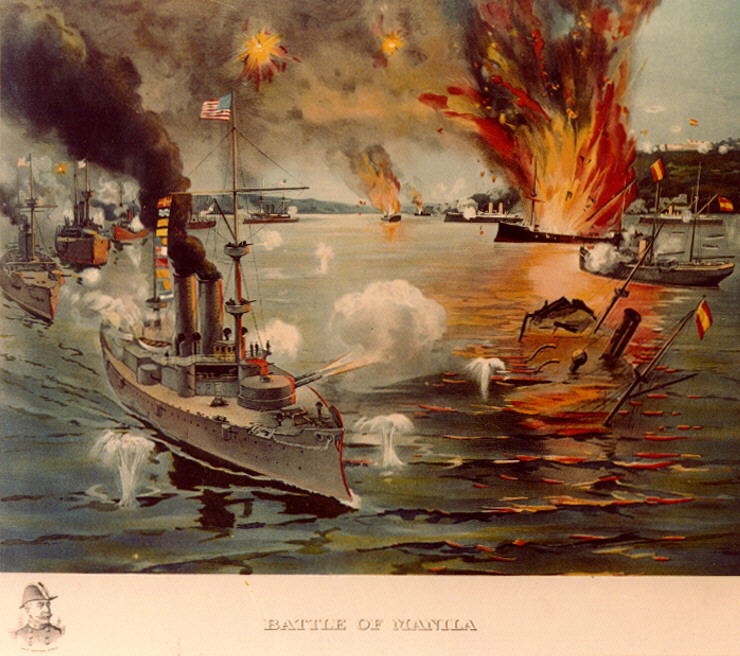The USA is undoubtedly the strongest military power in the world, and has often been willing to use that power against other nations, Some historians count 187 foreign wars in 200 years, and this youtube video lists the wars the US has fought in the twentieth Century, most of which, (in the earliest part of the 20th C) it can be argued, were won by the USA.
https://www.youtube.com/watch?v=Q51NFAkmE-g
This is not an argument about the rightness or wrongness of any war. The argument is why the mightiest ever military power, a political power that controls overwhelming destructive forces, a power that claims to stand on the side of its God, does not win wars?
Have you thought about this question?
In the next couple of years I want to write a paper that show the unintended consequences of the USA's invasion of the Philippines in 1899.*
USS Olympia in the left foreground, leading the U.S. Asiatic Squadron
Stemming from that war, the paper will argue, came a long chain of consequences climaxing with Mao Zedong on the podium of the forbidden city in Beijing, proclaiming the 'People's Republic of China.' An event that had a major consequences in the USA, with the McCarthy purges, and the development of a mindset that seems to have led the USA to be involved in unwinnable wars.
Past that point, I have in mind a second paper that will explore the failure of a west that has become more ideological than Mao's communists (or Joe Stalin's for that matter).
If you have thought about this broader picture, I'd be interested in what you may see as the reasons for this.
Since 1945, despite its overwhelming military technology, The USA has failed to achieve what we may call a solid victory. In both the Korean war and the Vietnam war the best the USA could achieve was a negotiated settlement.
Who can forget the bomb flattened cities of North Korea, but with citizens still willing to fight. Its true that an arrogant Macarthur made a huge strategic mistake by proceeding to the border of North Korea and China, and thus involving China in the war. But the willingness of North Koreans to fight on was remarkable.
And similarly, in Vietnam, more heavily bombed than Germany in WW2,
its country side literally poisoned with Agent Orange, the affects of which are still producing deformed children in Vietnam,
and yet the people continued to fight until the triumphant climax, when Vietnamese tanks broke down the gates of the US Embassy, as its occupants fled in helicopters.
That war in particular led to social division within the USA.
That division is part of the story, but is it a significant part? If it is significant, why have more recent wars not met with significant opposition? And yet, these wars have seen even more spectacular failure. Bush Jnr's wars in Afghanistan and Iraq have both failed.
In Iraq (an artificial state organised by the British, so that it was easier to control), the Sunni Muslim support base of Saddam Hussein ( a man who was supported by the USA to fight a proxy war against Iran) re-emerged in a much more dangerous form.
And, in Afghanistan (America's longest war) the Taliban enemy is still gaining control over more areas. There's a map on this link: http://www.longwarjournal.org/archives/2015/12/taliban-overruns-district-in-southern-afghanistan.php
that shows Taliban held areas (or, where they are strong enough to contest the western established government) . Click on the red areas to see what the Taliban are doing.
Bush's war has not been the success that the American elite thought that they could win.
Why?
* I will attempt to show that the invasion and colonisation of the Philippines turned the influential Chinese politician Dr. Sun Yatsen against the USA. (He actually attempted to supply the Filipino freedom fighters with weapons). He later sought help from the Communist Comintern and allowed the then small number of communists in the recently formed CPC to have a dual membership in his KMT party. The communists apparently (I still have to research this part of the story) made very rapid progress in China. Sun's successor, Chiang Kai Shek, opposed the Communists and set in train a series of events that led to the civil war of the late 1940's from which, the communists emerged as the victors. The communist victory was achieved by making alliances with a broad alliance of people who saw the CPC as the best hope for China. The CPC of the time was a party consisting of both dogmatic marxists and a more pragmatic strain of Chinese nationalists who were rationalists. The pragmatists eventually won control of the party (actually before Mao's death). Mao contested their control of the party with his Red Guards. What has emerged is a very pragmatic China that is willing to experiment.



